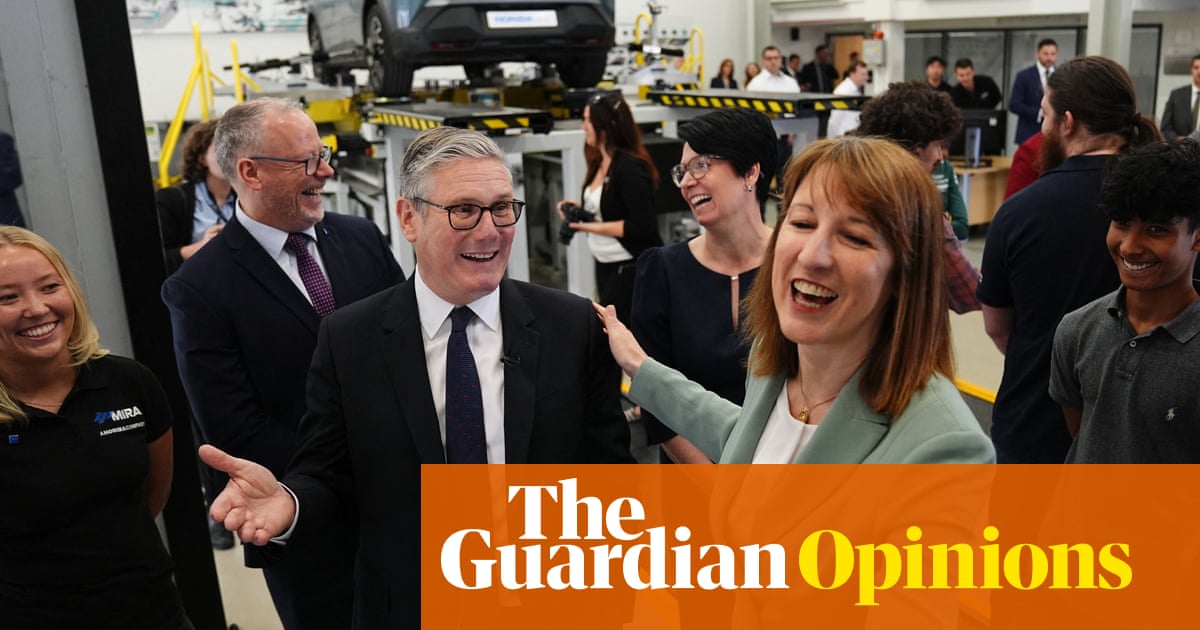Everyone in Westminster loves American politics. They – or, I should say, we – were raised on a diet of The West Wing and closely follow the twists and turns inside the Beltway coming from American media. This obsession has an effect on the real world: what happens in the US shapes British politics. Long ago this was seen in the parallels between Bill Clinton and Tony Blair’s “third way”; and this time last year Keir Starmer’s Labour party was looking to Joe Biden’s Democrats.
Biden went all-in on reforming the US economy. Through theChips and Science,Infrastructure Investment and JobsandInflation Reductionacts, he spent billions hoping to build more at home, boost growth and grow wages. It worked. Public investment led tomore than $1tn(£750bn) of private sector spending, and real wagesgrew by $4,000a person, with more for the worst off. Even with the pandemic, economic growth averaged 3% a year under Biden.
This is an economy the Labour government would die for and is one of the reasons it embraced its own version of Biden’s plans. Theindustrial strategyreleased today is the most concrete expression of Labour’s “securonomics” that it has given in government, after Rachel Reeves unveiled the strategy in Washington in opposition.
But for all Biden’s economic success, the Democrats did not win the election in 2024. Immediately commentators turned on the former president’s economic platform, arguing that long-term reform was a waste of time. Only one thing mattered when it came to votes:the price of eggs.
Labour hasn’t jettisoned its industrial strategy based on Biden’s loss, despite many urging it to. But for the strategy to be successful and to last the 10 years that Labour intends it to (not thethree yearsthat the Inflation Reduction Act did) the government will need to learn from Biden’s mistakes.
To understand how, the Institute for Public Policy Research (IPPR), where I work, spoke to more than 40 people in Washington, including many former senior White House officials. Here are two key lessons.
First, long-term reform is crucial but will always be slow. Expecting it to win votes now is a recipe for disaster. One former official put it this way: “Industrial policy achieved its goals … but nobody cares, we delivered on stuff they didn’t care about.” The problem was that even in the White House there wasn’t agreement on the purpose of industrial policy. While those running the policy were trying to make long-lasting clean energy investments, it was sold to the Democratic party as the way to beat Trump.
The interim effect was the same – money went to predominantly Republican districts (more because of their cheaper labour than a deliberate strategy). But building a factory, hiring people and eventually building things is a decade-long project. As one official said: “[Industrial policy] wasn’t going to transform the map in two years after 50 years of deindustrialisation.”
While Labour is explicit that this is a 10-year growth strategy, it can speed things up – planning reform will help. It must also address Britain’s workforce shortages now, not just think about skill development in the future. Rebuilding capability inside government is also vital. The US government was engaging for the first time in facilitating the production of new, rapidly developing technologies such as clean hydrogen. Creating policies such as thehydrogen tax credittakes time and expertise. Officials in the British government are going to need to get to grips with the intricacies of37 new high-potential subsectors.
The second lesson: to give long-term policies the space to succeed, governments need a short-term economic improvement to people’s lives. This is crucial: battery manufacturing projects are now being cancelled across the US because Democrats didn’t win a second term to protect them.
Biden’s team had wanted a broader economic story that spoke to inflation. But things that would actually help – cheaper childcare or tax provisions for working-class Americans – were cut out of legislation by the Senate. This was at a time when Covid-era support was expiring. Defending the imperfect Inflation Reduction Act and championing investments rang hollow with the public, who wanted to hear about prices coming down.
Labour has space to address this. The IPPR has conducted polling that tells us energy prices easily top every other economic issue as the public’s economic priority. Of those surveyed, 47% said they would prefer the government to focus on lower costs even if this meant stagnant wages (something the British public is well used to), as opposed to 12% who would take a wage rise even if costs went up too.
A final point is that the world is much bigger than the US and there are lessons to be learned elsewhere.In Spain, the prime minister, Pedro Sánchez, has overseeninvestment of €163bn(£140bn) in the green transition – but rather than relying solely on this, his government has also acted on the rising cost of housing bycapping rent increases. Anthony Albanese last month won a second term in Australia for the Labor party for similar reasons. HisAUS$22.7bn (£10.8bn) investmentin a future made in Australia – predominantly in clean energy – came withenergy bill relief, rent assistance and cheaper medicines.
So rather than sitting down for another rewatch of The West Wing, perhaps it would be a better strategy to examine how similar-sized countries elsewhere have given themselves the chance to make long-term industrial strategies work.
Sam Alvis is associate director at IPPR and a former political adviser to the Labour party
Do you have an opinion on the issues raised in this article? If you would like to submit a response of up to 300 words by email to be considered for publication in ourletterssection, pleaseclick here.
